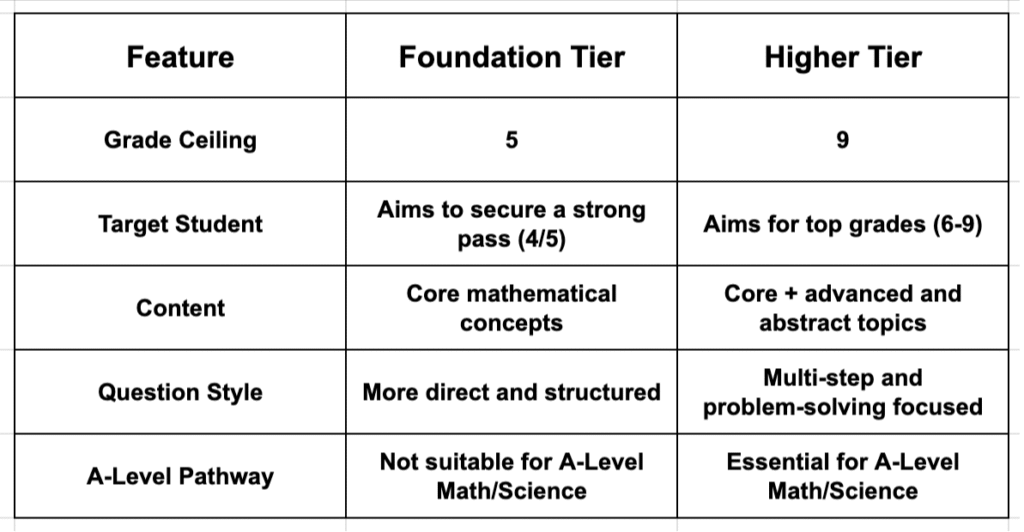GCSE/IGCSE Math: Foundation vs. Higher Tier – Making the Right Choice in Dubai
As your child progresses into Year 9 and 10, the conversation around their academic future intensifies. Of all the decisions made during this period, one of the most crucial for their mathematical journey is the choice of entry tier for their GCSE or IGCSE Math exam: Foundation or Higher.
This decision is far more than an administrative detail; it has profound implications for your child’s final grade, their A-Level options, and their future university prospects. For many parents, the distinction between the two tiers can be unclear, leading to anxiety and uncertainty.

This guide will provide a clear, balanced overview of both tiers, explain how schools in Dubai typically manage this process, and empower you to have a constructive conversation with your child and their teachers to ensure they are on the right path to success.
What Are Tiers in GCSE/IGCSE Math?
Tiered entry is a system designed to allow students of all abilities to achieve a grade that reflects their understanding. Instead of one exam for everyone, there are two separate papers with different content and, most importantly, different ranges of available grades. The school, in consultation with the student and parents, will decide which tier is the most appropriate for the student to enter.
The Foundation Tier: Building Confidence and Securing a Strong Pass
The Foundation tier is designed to be accessible and to build a student’s confidence in mathematics. It focuses on consolidating and applying the core mathematical skills needed for life and future study.
Content Focus: The curriculum covers the fundamental concepts of Number, Algebra, Geometry, and Statistics. The questions are generally more straightforward and context-based.
Grade Range: The highest grade a student can achieve on the Foundation tier is a Grade 5 (equivalent to a high C / low B in the old system). The lowest grade is a 1.
Who is it for? The Foundation tier is the right choice for students who have found math challenging and would benefit from a more focused curriculum. It is an excellent pathway for those who need a solid Grade 4 or 5 for their future plans but do not intend to study math at A-Level.
The Higher Tier: Aiming for the Top Grades
The Higher tier is designed for students who have a strong grasp of the core concepts and are ready to tackle more complex and abstract mathematics.
Content Focus: The curriculum includes all the Foundation content plus a significant amount of more advanced material, including complex algebra (like quadratic equations), advanced trigonometry, and more abstract geometrical reasoning. The questions are often multi-step and require a high level of problem-solving skill.
Grade Range: The grades available on the Higher tier range from a Grade 9 (higher than an A*) down to a Grade 4. It is important to note that if a student narrowly misses a Grade 4, they may be awarded a Grade 3.
Who is it for? The Higher tier is the essential and non-negotiable choice for any student who wishes to study Mathematics, Physics, Chemistry, Economics, or Computer Science at A-Level. Most top universities will require at least a Grade 7 (an A) in GCSE Math for these courses.
Foundation vs. Higher: A Head-to-Head Comparison

An Expert Tutor's Perspective on Choosing the Right Tier
We asked a seasoned private tutor in Dubai for her perspective on how parents can navigate this important decision.

Ms Sania Shahid, MSc in mathematics, 7 years of private tutoring experience in Dubai
“As a tutor who has guided many students through their GCSE/IGCSE journey, I know firsthand how big this decision can feel. Choosing between Foundation and Higher isn’t just about the exam; it’s about confidence, motivation, and long-term opportunities.
The most important thing is to look closely at your child’s strengths and aspirations. The Foundation tier can be an excellent choice for students who need a confidence boost, as it helps them secure good grades without the pressure of content they aren’t ready for. On the other hand, the Higher tier is essential for students who enjoy problem-solving and are aiming for subjects like Mathematics or the Sciences at A-Level.
I always tell parents not to see this decision as closing doors. The right support, whether through school or extra tutoring, can help students fill gaps, build confidence, and unlock their full potential, whichever tier they decide to take.”
Making the Right Choice: Questions for Your Family
This decision should be a collaborative conversation. Here are some questions to guide you:
What are my child’s genuine aspirations for A-Level and beyond? If STEM subjects are on the table, the Higher tier is a must.
What does the teacher recommend? They have the data and the classroom experience to make an informed judgment.
Is my child’s current struggle due to a lack of ability or a gap in their foundational knowledge? Often, a student is placed in the Foundation tier simply because they have a few key misunderstandings from previous years.
If you suspect it’s the latter, this is the perfect time to intervene. The right expert GCSE math support can quickly diagnose and fix these foundational weaknesses, potentially transforming a borderline Grade 5 student into a confident Grade 7 candidate.
Conclusion: A Pathway to Potential
The choice between the Foundation and Higher tier is a strategic decision that sets the pathway for your child’s future academic journey. The goal is to choose the tier that allows your child to be challenged appropriately and to achieve the highest grade they are capable of.
Have an open and honest conversation with your child and their teacher. By understanding the purpose of each tier and your child’s unique strengths, you can make a confident choice that unlocks their full potential.
If you would like a professional assessment of your child’s readiness for the Higher tier or require targeted support to help them succeed, our experienced British curriculum math tutors are here to help.